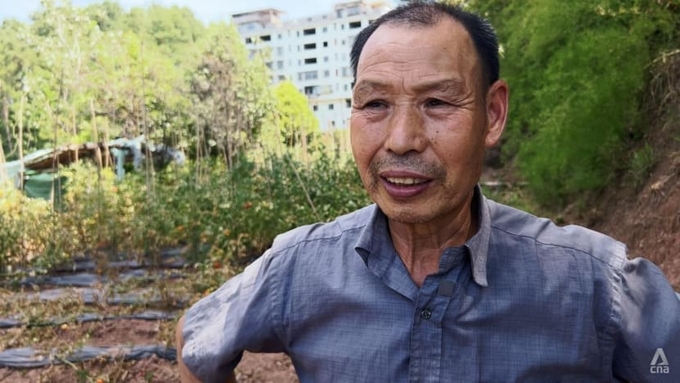June 16, 2025 | 23:45 GMT +7
June 16, 2025 | 23:45 GMT +7
Hotline: 0913.378.918
June 16, 2025 | 23:45 GMT +7
Hotline: 0913.378.918

Farmer Wang Yong Fu, 70, says that it is impossible to grow any crops amid the heatwave. Photo: CNA
It was 42 degrees Celsius outside and no farmers were in sight. The weather was too sweltering for both humans and crops.
Farmers said they start work in the fields at 3am these days. When daylight arrived, it would be time to find shade indoors.
Wang Yong Fu, 70, has been toiling in the fields for his entire life. He pointed at the shrivelled tomato plants that should have been at least waist-high under normal weather conditions.
“The key is it’s not possible to grow them. Whatever you do, you can’t grow anything. We are in the fields every day but we can’t do it. I can’t harvest any cabbage these days. The crops have all died,” he told CNA.
Weeks of baking temperatures and no rainfall had left 66 rivers and 25 reservoirs dry in Chongqing – where peak temperature had reached a record 45 degrees Celsius in the past month.
In July and August, China experienced its longest and most intense heat wave since meteorological records began in 1961.
The heat has seriously affected agricultural production in parts of the country and could result in higher food inflation going forward.
REDUCED YIELDS
Some local farmers have said that they were getting 80 per cent less yield than before.
“I planted two fields. All the crops have dried and died. The soil is as hard as rock,” said Zhou Qi, a 73-year-old farmer in Xinshi village in Chongqing.
The Central Meteorological Observatory had warned that the unprecedented heatwave would affect the production of grains like soybean, wheat and corn.
Agricultural tractors tend to catch fire under high heat, which made farmers less inclined to use them this summer.
As the planting season has begun, experts said the impact will be felt come harvest time.
“Particularly, leafy green vegetables are really heat sensitive. So even before talking about the drought, just having day after day of 40 degrees temperature, it does damage to that. And it's taken a while but that's the beginning to show up at prices at market,” said Even Pay, an agricultural analyst at policy analysis startup Trivium China.
Already, vegetables and fresh fruits prices have jumped in July by 12.9 per cent and 16.9 per cent year on year. Pork prices have also gone up 20.2 per cent in July from a year ago.
According to central government statistics, over two million ha of arable land and 350,000 livestock were affected by the summer heat wave.
According to Chinese government statistics, over two million hectares of arable land and 350,000 livestock were affected by the summer heat wave. (Photo: CNA/Emil Wan)
Wang, who grows rice and an assortment of vegetables, said several of his chickens had died. “For 10 days or so, the chicken pen was so hot, even my largest chicken that weighed over 4kg died.”
Without cooling measures, Pay said it only takes a couple of days of 40 degrees Celsius temperature for animals to die.
Another factor pushing up prices is the rising cost of grain imports.
During the drought, water levels were so low that some inland shipping routes were no longer viable.
The Yangtze River is a key logistics channel for the shipping of imported agricultural commodities like corn and soybean, which are unloaded at a port in Wuhan to get processed into livestock feed in central China.
These shipping channels had been cut off and ships had to unload much closer to the coast, Pay said, which added time and cost. As a result, some major feed producers said they will raise the prices of pig, poultry and fish feed.
The regions affected by the drought account for about 30 per cent of China’s rice production area.
But even if there is a shortage of rice – a staple food in China – experts said the government is likely to stabilise grain prices by tapping on its stockpile.
China’s grain reserves are the largest in the world, containing enough to feed China’s population for a year even without any harvest this year.
“I don’t think there will be an immediate food crisis,” said Wang Dan, the chief economist at Hang Seng bank.
(CNA)

(VAN) Extensive licensing requirements raise concerns about intellectual property theft.

(VAN) As of Friday, a salmonella outbreak linked to a California egg producer had sickened at least 79 people. Of the infected people, 21 hospitalizations were reported, U.S. health officials said.

(VAN) With the war ongoing, many Ukrainian farmers and rural farming families face limited access to their land due to mines and lack the financial resources to purchase needed agricultural inputs.

(VAN) Vikas Rambal has quietly built a $5 billion business empire in manufacturing, property and solar, and catapulted onto the Rich List.

(VAN) Available cropland now at less than five percent, according to latest geospatial assessment from FAO and UNOSAT.

(VAN) Alt Carbon has raised $12 million in a seed round as it plans to scale its carbon dioxide removal work in the South Asian nation.

(VAN) Attempts to bring down the price of the Japanese staple have had little effect amid a cost-of-living crisis.